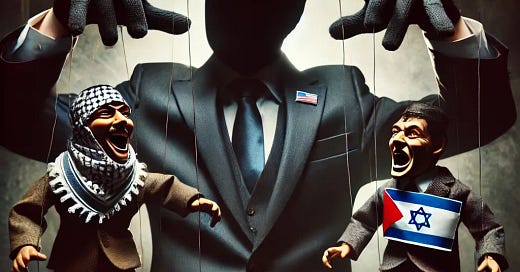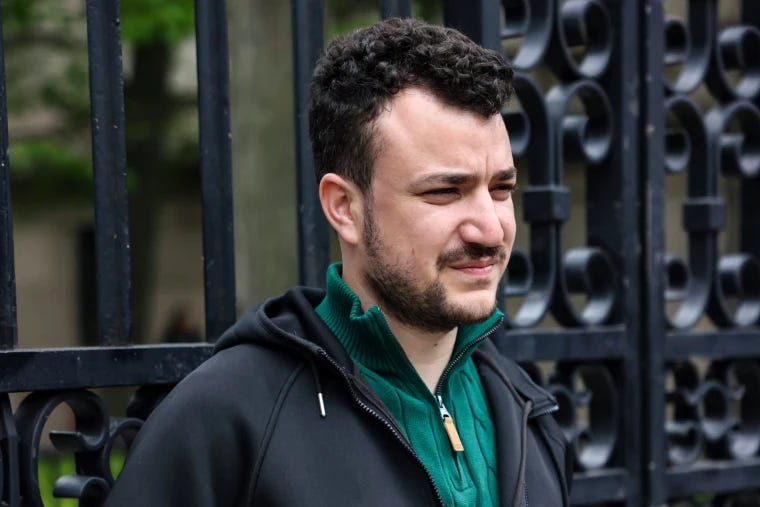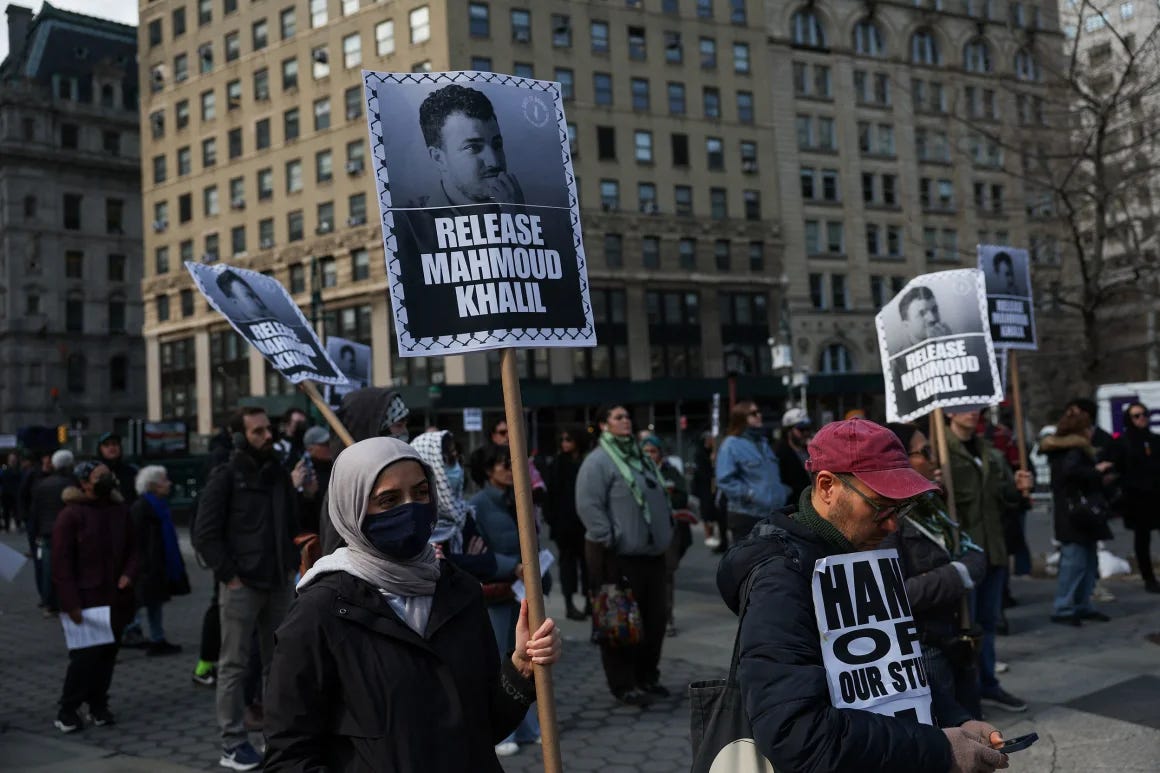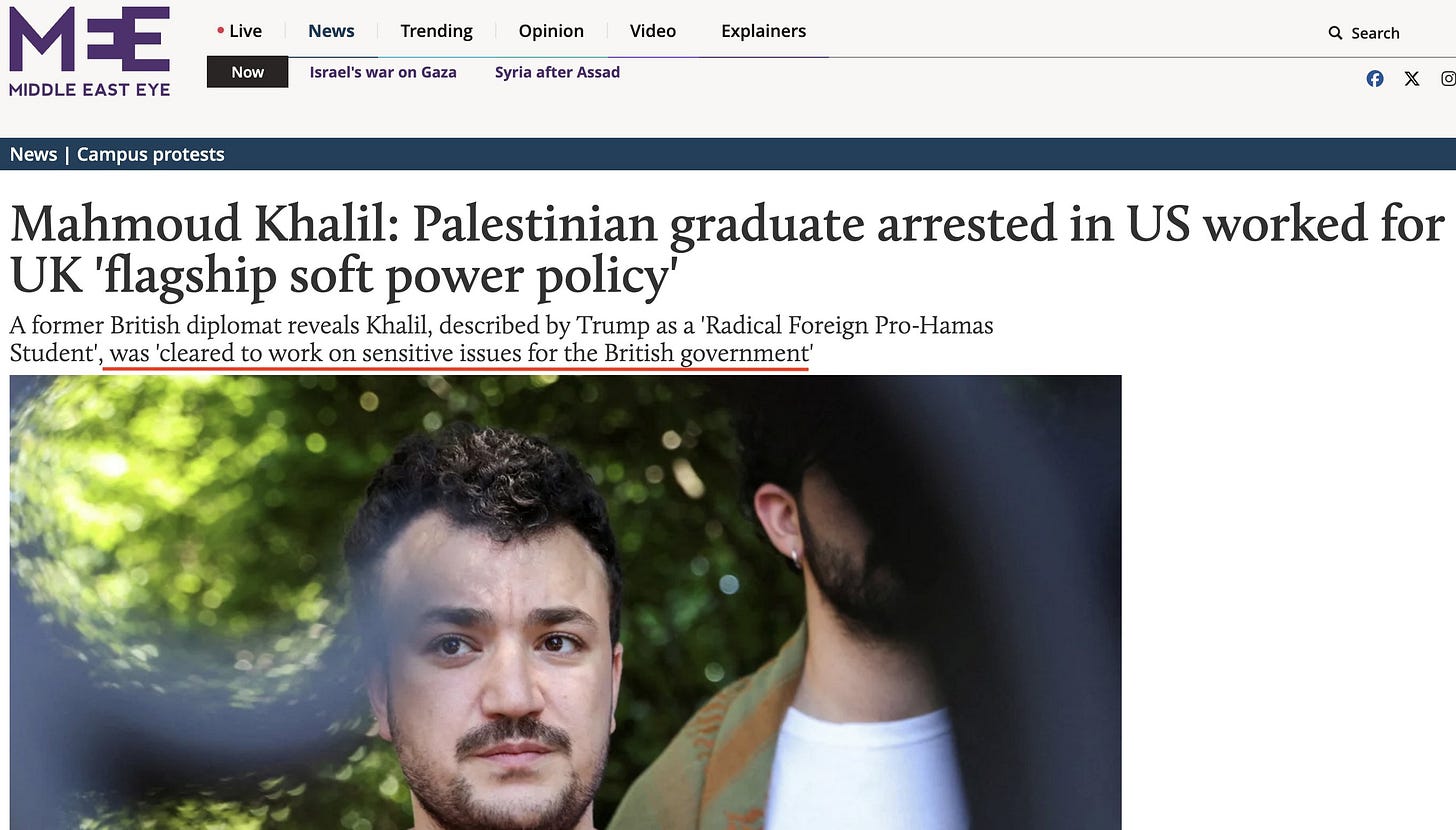Mahmoud Khalil: Refugee Advocate or Pawn in a Global Game
Mahmoud Khalil’s arrest sparks debate: Is he a pro-Palestine hero or a tool of Western intelligence? Dive into his murky past and a chilling conspiracy.
Mahmoud Khalil, a Palestinian-American and former Columbia University student, was arrested by ICE on March 9, 2025, and faces possible deportation, linked to his role in pro-Palestine protests.
However, we thankfully, live in the age of the internet.
And the internet can very often turn up some surprising things…
THE BACKGROUND
Mahmoud Khalil, a 30-year-old Algerian citizen of Palestinian descent, was a graduate student at Columbia University’s School of International and Public Affairs. He became a prominent figure in pro-Palestine protests, particularly those demanding a ceasefire in Gaza and university divestment from companies with ties to Israel.
On March 9, 2025, ICE arrested Khalil, revoking his green card, amid claims he led activities aligned with Hamas, a designated terrorist organization by the U.S. A federal judge blocked his deportation temporarily, with a hearing scheduled for March 27, 2025, in Louisiana. Despite the arrest, Khalil has not been charged with any crime, raising questions about the legal basis for his detention.
Khalil is notably associated with the Columbia University Apartheid Divest (CUAD) group, a coalition of student organizations pushing for Columbia to divest from companies they accuse of profiting from Israeli policies. CUAD is part of the broader Boycott, Divestment, and Sanctions (BDS) movement against Israel, focusing on ethical investment practices.
Khalil his master’s degree at Columbia University’s School of International and Public Affairs in December 2024. Born in Syria, he is married to a U.S. citizen and was a legal permanent resident. His involvement in campus activism began notably during the 2024 pro-Palestine protests at Columbia, where he served as a negotiator for students during discussions with university officials over a tent encampment established in spring 2024. These protests called for a ceasefire in Gaza, an end to the war that has resulted in nearly 50,000 Palestinian deaths, and Columbia’s divestment from companies with ties to Israel.
Following his arrest, Khalil was briefly detained in New Jersey before being transferred to a federal jail for migrants in Louisiana, awaiting deportation proceedings. A notice to appear before an immigration judge was issued, with a hearing set for March 27, 2025, in Louisiana. A federal judge in New York, Jesse M. Furman, blocked his deportation temporarily on March 10, 2025, to preserve court jurisdiction, with a hearing scheduled for March 12, 2025, in New York City.
The results of the hearing determined that Khalil would remain in an ICE detention facility in Louisiana for now. Any immediate effort to deport him was blocked by NY Federal Judge Jesse Furman. Khalil is being represented by Ramzi Kassem.
PULL THE THREAD
Before his prominence as a Columbia University activist, Khalil earned a degree in computer science from the Lebanese American University. This was followed by working with the Syrian-American non-profit Jusoor.
He also managed the Syria Chevening Programme for the British Embassy in Beirut, offering scholarships for study in the UK.
The Chevening scholarship is a program of the Foreign, Commonwealth and Development Office (FCDO) and aims to "support UK foreign policy priorities and achieve FCDO objectives by creating lasting positive relationships with future leaders, influencers, and decision-makers."
He was also a local manager for the Conflict, Stability, and Security Fund.
Interestingly, the Conflict, Stability and Security Fund — has used large amounts of money from the British aid budget to support the opposition in Syria.
This work stopped over 2 years ago, around the same time he moved to the US (2022).
Additionally, from June to November 2023, Khalil served as a political affairs officer with the United Nations Relief and Works Agency (UNRWA) in New York, a UN agency focused on providing humanitarian aid and protection to registered Palestinian refugees across Jordan, Lebanon, Syria, and the occupied Palestinian territory.
Interesting stuff about the UNRWA.
The UNRWA was established in 1949 to aid Palestinian refugees following the Nakba, providing education, healthcare, and social support in regions like Gaza, the West Bank, Jordan, Lebanon, and Syria.
1949. That was over 70 years ago.
Today, it employs over 30,000 staff, mostly Palestinians, serving 5.9 million registered refugees, offering education, healthcare, and humanitarian aid.
Unlike the UNHCR, UNRWA’s mandate is specific to Palestinian refugees, with a broader definition that includes descendants of refugee males, including adopted children. Additionally, UNRWA’s definition does not disqualify refugees based on citizenship or residency status.
So, even if a 1949 refugee relocated to Jordan and gained citizenship, they and their descendants (or adopted children) would still be considered a refugee.
Today, fewer than 200,000 original 1948 refugees are alive.
This has been argued to be perpetuating refugee status, rather than try to resolve it.
AKA Keep the money flowing.

On October 7th, 2023, a Hamas-led attack on Israel killed 1,200 people and took over 240 hostages. In January the following year, Israel accused at least 12 UNRWA employees of participating.
The IDF provided specific evidence, including recordings of UNRWA teachers, such as Yusef Al Hawajara, saying, “We have female hostages, I captured one,” and Mamdouh Ahmed Alkali, stating, “I’m inside, I’m inside with the Jews.”
The IDF then claimed that over 450 UNRWA employees are terrorists, mainly from Hamas, with videos showing UNRWA workers loading Israeli civilian corpses
This led to a pause in funding from about a dozen countries, including the US.
How does this tie to Khalil?
He was working for them at the time of the bombing. He left the following month.
THE UNTOLD NARRATIVE
Khalil’s career paints a picture of a man dedicated to education and refugee support, yet repeatedly drawn into roles with organizations entangled in political and ethical controversies.
FCDO’s historical links to MI6 are well-documented, with diplomats often collaborating on intelligence goals. Look at Richard Moore:
Current Chief of MI6
Former Director General for Political Affairs at FCDO
British Ambassador to Turkey (which had been overthrown by the CIA)
The CSSF’s oversight by the National Security Council, including MI6 input, and its funding of Syrian opposition media suggest intelligence adjacency. Khalil’s roles, requiring security clearance, likely involved vetting by MI6, but there’s no proof he was an operative.
Khalil’s role with the CSSF placed him within a UK initiative criticized for its support of Syrian opposition groups, some potentially linked to extremism. While Khalil’s responsibilities were likely administrative, the fund’s broader implications cast a shadow over his tenure.
His time at UNRWA overlapped with allegations of employee involvement in terrorism, amplifying questions about his associations, even if his New York-based role distanced him from the accused field staff.
THE DARKER THEORY
Beneath the surface of Mahmoud Khalil’s career—from his humanitarian beginnings with Jusoor, through his roles with the FCDO’s Chevening Programme and CSSF, to his brief tenure at UNRWA—lies a provocative possibility:
That his trajectory, and the institutions he served, might fit into a "controlled opposition" narrative orchestrated by Western intelligence.
This theory draws on historical precedents like Operation Gladio, a NATO initiative where Western intelligence agencies, including the CIA and MI6, funded and manipulated ostensibly anti-communist groups—sometimes even conducting terrorist acts—to shape political outcomes in Europe.
Could Khalil’s path, culminating in his arrest by ICE for alleged Hamas ties, reflect a modern echo of such strategies? Is he just a pawn in a grander geopolitical chess game?
Consider the pieces.
Jusoor, a Syrian-American non-profit, channels Western funds into education for Syrian refugees, ostensibly apolitical yet aligned with U.S. soft-power goals in a region ripe for influence. Its lack of overt intelligence ties doesn’t preclude passive monitoring by agencies like the CIA, especially given its diaspora connections and Open Society connections—Soros’s network.

Khalil’s early role here could have marked him as a useful figure: educated, multilingual, and tied to a refugee cause with strategic value. Not to mention, his upbringing and parent’s plight following the Nakba.
His move to the British Embassy in Beirut amplifies the theory.
The FCDO (formerly “Foreign Office”), with its MI6 lineage, runs the Chevening Programme to cultivate future leaders—a benign facade that could double as a recruitment pool for intelligence assets.
More telling is the CSSF, which poured £350 million into Syria’s opposition. Khalil’s role as a local manager, overseeing stability projects in Lebanon, placed him in a nexus of UK policy and intelligence—vetted by MI6, he managed funds that may have indirectly bolstered groups with extremist ties.
Was he an unwitting cog, or a planted figure to legitimize opposition efforts while keeping them under Western control?
The UNRWA association in 2023 adds a twist.
During the October 7 Hamas attack, UNRWA faced accusations of employee terrorism—over 450 alleged Hamas affiliates, per the IDF—prompting U.S. funding cuts. Khalil’s New York-based advocacy role during this crisis positions him as a potential observer or even a conduit, though not an operative in Gaza.
UNRWA’s unique mandate, criticized for perpetuating Palestinian grievances, aligns with a controlled opposition frame:
Sustaining a refugee crisis to justify intervention, monitored by Western intelligence like the CIA, who’ve long “tracked” Hamas.
Or perhaps, given them their orders.
This darker theory posits Khalil is a figure shaped by Western intelligence—not necessarily a witting agent, but a controlled element in a decades-long strategy to manage opposition, from Syrian rebels to Palestinian activists.
The question everyone should be asking isn’t “Who is Mahmoud Khalil?” It should be:
“Whose game is he playing—and who’s holding the board?”










